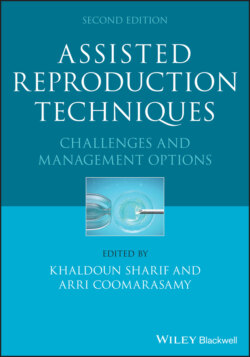Читать книгу Assisted Reproduction Techniques - Группа авторов - Страница 126
Key points
ОглавлениеChallenge: ART in women with thyroid disease.
Background:
Abnormal thyroid function, particularly during the first trimester of pregnancy, is associated with increased pregnancy risks and can impact on the neurodevelopment of the child.
Controlled ovarian stimulation and pregnancy are associated with increased thyroxine requirements.
Carbimazole, methimazole and propylthiouracil are associated with teratogenicity, but the risk is least with propylthiouracil.
Reference ranges for thyroid function tests vary according to the laboratory assay, ethnicity of the population and stage of pregnancy. Thyroid treatments should ideally be optimized.
Management options:
In hypothyroid women already on thyroxine treatment:Thyroxine dosage should be increased at the start of ovarian stimulation and as soon as pregnancy is confirmed to prevent the development of hypothyroidism.Thyroid function test should be performed every 4–6 weeks during pregnancy.Thyroxine requirements should be adjusted to maintain TSH within the lower half of the trimester specific reference ranges.
In hyperthyroid women on anti‐thyroidal treatment:If on carbimazole or methimazole, convert to propylthiouracil prior to conception.Thyroid function test should be performed during COS and every 2–4 weeks during pregnancy.Antithyroid treatment should be kept to the minimum dosage required to maintain free T4 concentrations in the upper third of the normal range.
